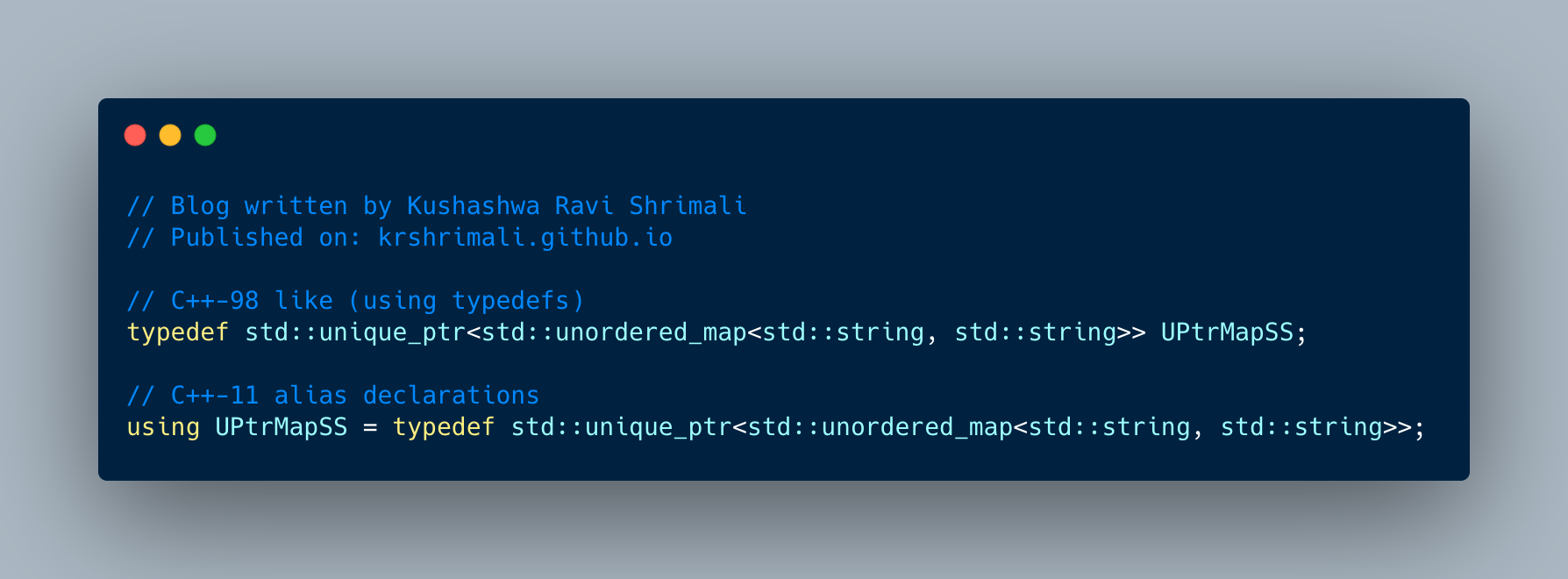One solution to avoiding using long type names:
// So C++98 like
typedef std::unique_ptr<std::unordered_map<std::string, std::string>> UPtrMapSS;

NOTE
My notes on Chapter 3, Item 9 of Effective Modern C++ written by Scott Meyers.
Some (or even all) of the text can be similar to what you see in the book, as these are notes: I’ve tried not to be unnecessarily creative with my words. :)
C++11 also offers alias declarations:
using UPtrMapSS = typedef std::unique_ptr<std::unordered_map<std::string, std::string>>;
Advantages of alias declarations over typedefs:
For types involving function pointers, aliases are easier to read (for some people):
// typedef typedef void (*FP)(int, const std::string&); // alias declaration using FP = void (*)(int, const std::string&);Alias declarations can be templatized, but typedefs can not.
// MyAlloc is a custom allocator template <typename T> using MyAllocList = std::list<T, MyAlloc<T>>; MyAllocList<Widget> lw; // will create std::list<Widget, MyAlloc<Widget>>vs: typedef, a hack way:
// templatized struct here template <typename T> struct MyAllocList { typedef std::list<T, MyAlloc<T>> type; }; MyAllocList<Widget>::type lw;In case you want to use a type specified by template parameter, with typedefs it gets complex:
// MyAllocList is defined as mentioned in 2nd point template <typename T> class Widget { private: typename MyAllocList<T>::type list; // ... };- Here
MyAllocList<T>::typeis now a dependent type (dependent on typeTfrom template paramater). - C++ Rule: need to use
typenamebefore name of a dependent type.
With alias declaration of
MyAllocList, no need to usetypenameand::type:template <typename T> class Widget { private: // no typename and ::type MyAllocList<T> list; // ... }- Here
Explanation on the 3rd point:
- Compiler understands the alias declared
MyAllocListwhen used inside a template classWidgetasMyAllocList<T>is not a dependent type. - A user can have
typeas a data member, and thus it’s important to mentiontypenamewhen usingMyAllocList<T>::type(as a type), so that compiler knows it’s a type.
Creating revised types from template type paramaeters is a common practice in Template Meta Programming (TMP). A few important points to note:
In C++11 (in header: <type_traits>):
std::remove_const<T>::type // yields T from const T
std::remove_reference<T>::type // yields T from T& and T&&
std::add_lvalue_reference<T>::type // yields T& from T
In case you are applying the above transformations inside a template to a type parameter, you’ll have to use typename. This is because they have been implemented as typedefs inside templatized structs.
In C++14, their alias equivalent were added which do not require you to prefix typename:
// equivalents to the above 3 transformations
std::remove_const_t<T>
std::remove_reference_t<T>
std::add_lvalue_reference<T>
Acknowledgement
- Thanks to Kshitij Kalambarkar for reviewing this blog.
Thanks for reading!
{{ template “_internal/disqus.html” . }}